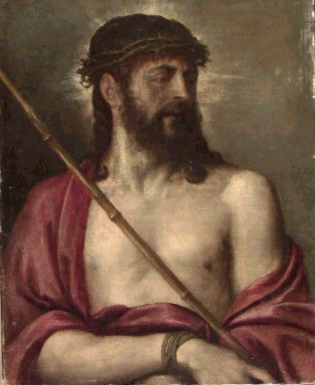Dostoevsky, Crime and Punishment: epilogue
First of all,
on the off-chance that some of you are finding it difficult to do all
of the C&P reading quite as closely and thoroughly as you would
like to, please make sure that if nothing else, you have read the
ENDING of the novel: i.e., Part 6, Chapter VIII and the Epilogue
(pp.521-551). We will open our discussion tomorrow with a consideration
of this ending (were you satisfied?, did it "fit"?, was it
what you expected?, etc.), so please ensure that you have read it closely.
So far,
we have talked about the moral and philosophical discourses operating
in the novel, and the way the characters are used to delineate these;
we have considered the moral and philosophical motives behind--and consequences
of--Raskolnikov's crime; we have discussed the "split" or
"schism" (raskol) in Raskolnikov's character, and how
he attempts to resove it by murdering Alyona; we have explored the symbolism
at work in vivid episodes such as Raskolnikov's dream; we have coined
a number of CFDs ("clumsy fake dichotomies") that Dostoevsky
seems to be exploring/manipulating.
We ended class on Thursday with a consideration of a characterological
CFD:
Alyona
(pawnbroker)/Lizaveta (sister)
--the two victims of Raskolnikov's crime. We talked about how these
two victims represent two qualitatively different murders: Alyona is
the victim of the murder Raskolnikov intended to commit (with
its carefully constructed, political/philosophical justificatory framework),
whereas Lizaveta is an unintended victim, whose killing is not justified
by any of Raskolnikov's arguments. We also noted that
(a)
Sonya was socially connected to Lizaveta.
(b)
Svidrigailov is rumored to have intentionally killed the Lizaveta
figure in his backstory; does this point to an important difference
between Svidrigailov and Raskolnikov (note that Svid. insists on their
mutual resemblance)? Does Lizaveta's death haunt Raskolnikov
in a different way from Alyona's?
I'd like you to think about ways in which this CFD, Alyona vs. Lizaveta,
might reflect other CFDs we have touched upon in our discussion of this
work (and of other works this semester), such as:
reason/instinct
shame/guilt
Crime/Punishment
"extraordinary"/"ordinary"
justice/mercy
In this connection, see especially the scene between Raskolnikov and Sonya, Part 4, Chapter IV (pp. 314ff.).
Continue to explore the following:
- parallels between characters
- ideational orientation of characters:
"Science"
(Utilitarian arithmetic/"extraordinary man" theory/
"law of Nature")
------------------------------------------------------------
Luzhin
Lebezyatnikov
Svidrigailov?
Raskolnikov?
(NB--Razumikhin forcefully rejects this line of reasoning, p.263)Christian morality
(reading/quoting Gospels)
--------------------------
Marmeladov*
Sonya
Pulkheria Ivanovna (Rask's mother)
Where do the following characters fit in (or do we need to create new categories for them)?- Porfiry Petrovich
- Dunya (aka Avdotya Romanovna, Rask's sister)
- Razumikhin
- Katerina Ivanovna
 *Marmeladov
refers (p. 15) to John 19:5, where Pilate presents Jesus to the crowd
with the words "Behold the man!" (Ecce homo!) This
moment in the story of the Passion is rich in imagery, having been
painted by a number of famous artists. One of the most famous renditions
is this one by Titian (Tiziano Vecellio, ca. 1487-1576); you
can link to others from this
page at artcyclopedia.com, which lists paintings of each of the
different stages of the Passion (you'l find Ecce homo under
the heading, "Christ Crowned with Thorns/The Mocking of Christ
"). Why should this image be a particularly significant one for Crime and Punishment?
*Marmeladov
refers (p. 15) to John 19:5, where Pilate presents Jesus to the crowd
with the words "Behold the man!" (Ecce homo!) This
moment in the story of the Passion is rich in imagery, having been
painted by a number of famous artists. One of the most famous renditions
is this one by Titian (Tiziano Vecellio, ca. 1487-1576); you
can link to others from this
page at artcyclopedia.com, which lists paintings of each of the
different stages of the Passion (you'l find Ecce homo under
the heading, "Christ Crowned with Thorns/The Mocking of Christ
"). Why should this image be a particularly significant one for Crime and Punishment?
- ideational orientation of characters:
- Make a list of all the episodes in which Raskolnikov gives, receives,
or rejects charity. Can we draw any conclusions about the role of
charity in (a) the moral universe of the novel, (b) Raskolnikov's psychology?
- Do the same for Raskolnikov's confessions and near-confessions. What prompts him to confess? What prompts him to suppress his confession?
Misc. other questions
- Is there anything Quixotic about Raskolnikov's journey?
- Are there 2 kinds of people?
- What, finally, does Raskolnikov want? Have his needs changed over the course of the novel?
 All the original content on these pages is licensed under a Creative
Commons License. Under this license, you may copy, alter, and redistribute any of the
original content on this site to your heart's content, provided that you
(a) credit me and/or link
back to this page; and (b) allow others to make similarly free use of any
work you create that is based on material from these pages. In other words,
share the love. You might also like to drop
me a line and let me know if you're using my stuff -- it's the nice
thing to do!
All the original content on these pages is licensed under a Creative
Commons License. Under this license, you may copy, alter, and redistribute any of the
original content on this site to your heart's content, provided that you
(a) credit me and/or link
back to this page; and (b) allow others to make similarly free use of any
work you create that is based on material from these pages. In other words,
share the love. You might also like to drop
me a line and let me know if you're using my stuff -- it's the nice
thing to do!
